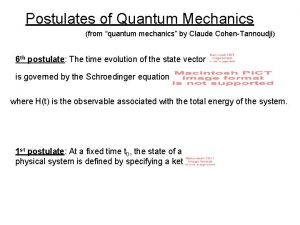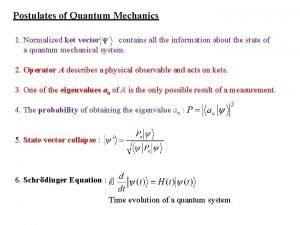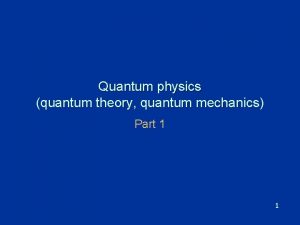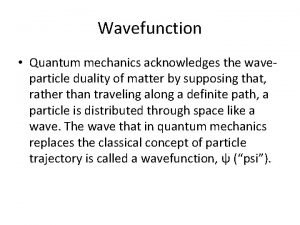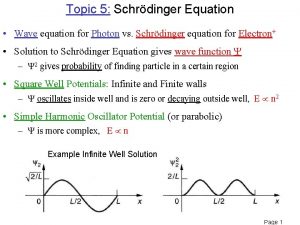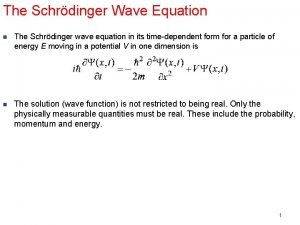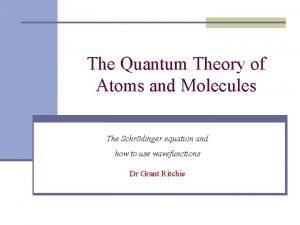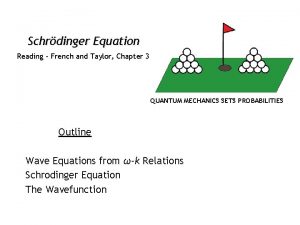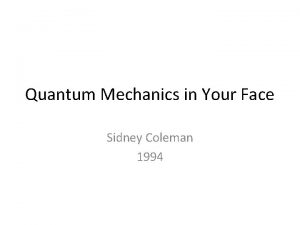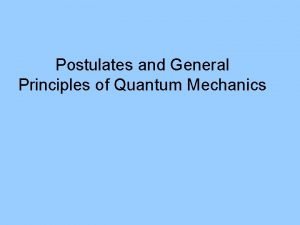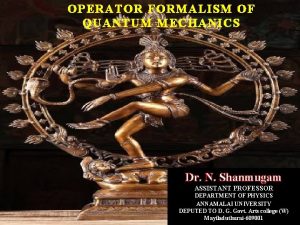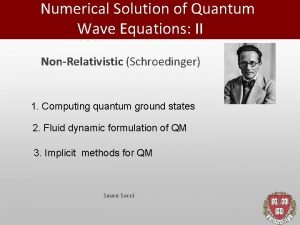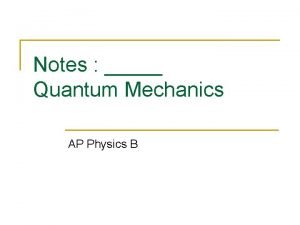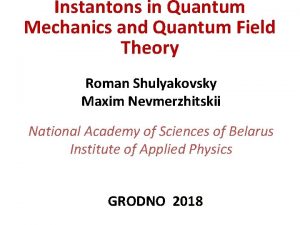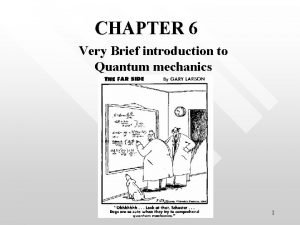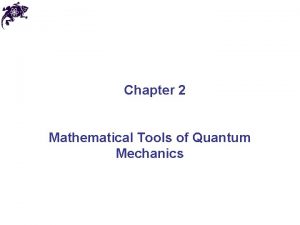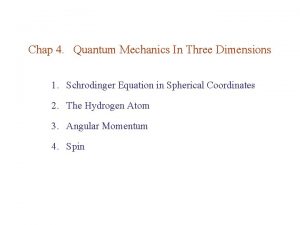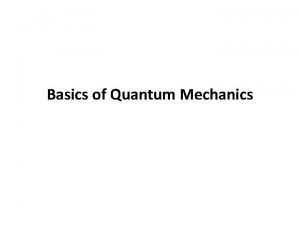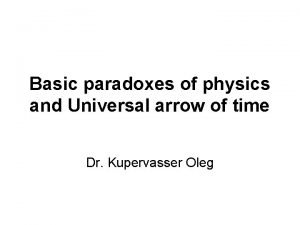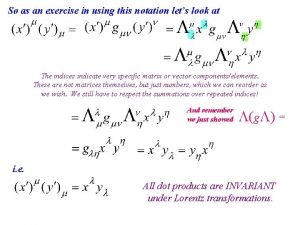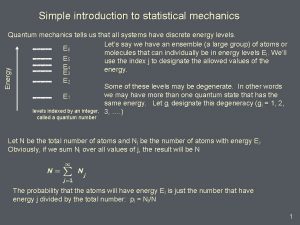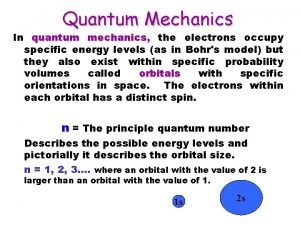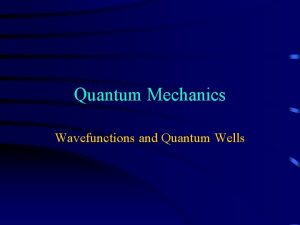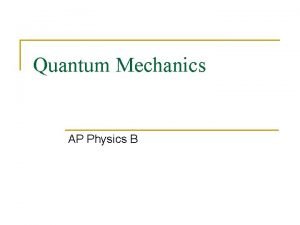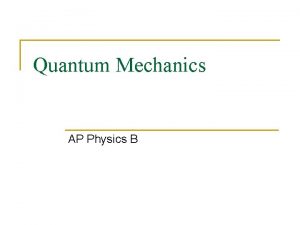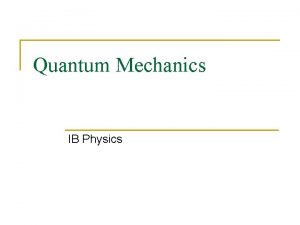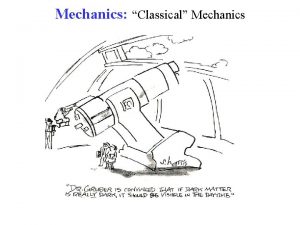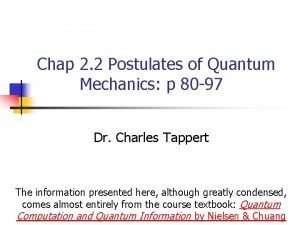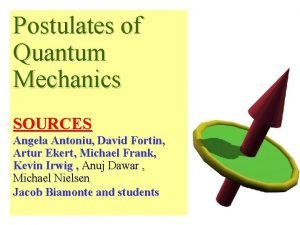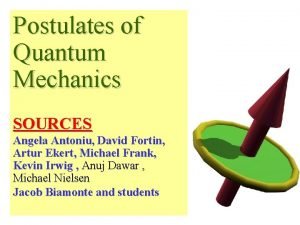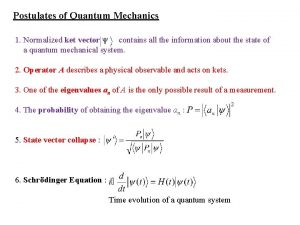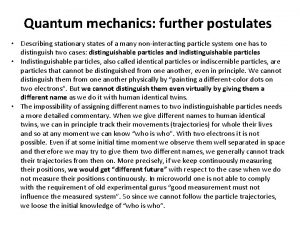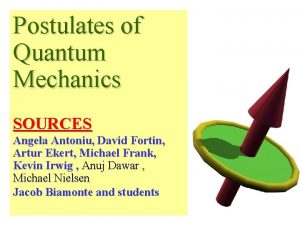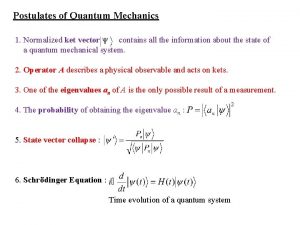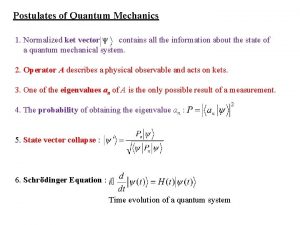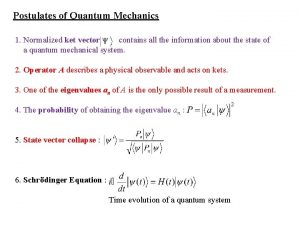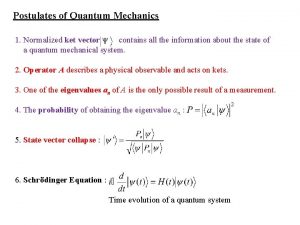Postulates of Quantum Mechanics The Fundamental Rules of
























- Slides: 24

Postulates of Quantum Mechanics

The Fundamental Rules of Our Game • Any measurement we can make with an experiment corresponds to a mathematical “operator” • Operator: A mathematical machine that “acts on” a function and produces a new function: We say A-hat “acts on” f And produces a new function g An operator. We put “hats” (circumflexes) over them

The Fundamental Rules of Our Game • Some operators we are already familiar with: Multiply by a constant Derivatives Integrals Functions themselves

The Fundamental Rules of Our Game • Operators in quantum mechanics are “linear”: Operators are distributive Constants can be pulled out

The Fundamental Rules of Our Game • What are the actions of the operators on the functions? Are they linear operators? a. b. c. d.

The Fundamental Rules of Our Game • Eigen-system: When an operator acts on a function and produces the same function multiplied by a constant: Multiplied by a constant Act A on f Get f back f is an eigenfunction or eigenvector a is an eigenvalue (a constant!)

The Fundamental Rules of Our Game • Are these eigen-systems? If so, what are the eigenfunctions and eigenvalues?

The Fundamental Rules of Our Game • Postulates of Quantum Mechanics 1. Every observable (measurable quantity) corresponds to a linear operator • Energy (Kinetic, Potential and Total) The Hamiltonian • Position • Momentum

The Fundamental Rules of Our Game • Postulates of Quantum Mechanics 2. All that can be known about a physical system (i. e. its state) is encoded in its wave function • Wave functions, y(x) are also called state functions • y is not a physical entity!! • y 2 dx represents “a little bit” of probability y 2 = |y|2 =y*y is a probability density This is physical, i. e. we can measure it

The Fundamental Rules of Our Game • Postulates of Quantum Mechanics 2. All that can be known about a physical system (i. e. its state) is encoded in its wave function • y* means conjugate E. g.

The Fundamental Rules of Our Game • Postulates of Quantum Mechanics 2. All that can be known about a physical system (i. e. its state) is encoded in its wave function • Sum of all the little bits of probability “over all space” = 1 • This is called the normalization condition • We say the wave function must be normalized

The Fundamental Rules of Our Game • Postulates of Quantum Mechanics 3. Every observable satisfies an eigen-system. • Physical observables are eigenvalues of their operators • The eigen-system we are MOST interested in: The Schrodinger Equation We are interested in eigenfunctions of the Hamiltonian, whose eigenvalues are energies Spectra are made up of energies!

The Fundamental Rules of Our Game • Postulates of Quantum Mechanics 3. Besides being eigenvalues of some eigen-system, observables are also average values • From statistics an average value is: Discrete outcomes, like rolling dice Continuous outcomes, like body weights

The Fundamental Rules of Our Game • Postulates of Quantum Mechanics 3. Besides being eigenvalues of some eigen-system, observables are also average values • Generalization of average value of observables for quantum mechanics:

The Fundamental Rules of Our Game • Say we have a physical system with a wave function: • Is it an eigenfunction of ? ? • What is the average value of position? • You need:

Uncertainty • We can find average values for any operator • This includes products of operators: E. g.

Uncertainty • We can find average values for any operator Average value of A-squared operator Average value of A operator, squared

Uncertainty • The standard deviation (spread) in the values we’d measure is: • In physics, we call standard deviation: uncertainty • Statisticians are still arguing with each other about the definition of uncertainty… • Reality is that there alternative definitions.

Uncertainty • In statistics you learn about an alternative measure of spread, variance: • Both definitions of standard deviation and variance are identical to what you learned in statistics.

Uncertainty • Uncertainty holds a special status in quantum mechanics • Heisenberg uncertainty relation: It is impossible to simultaneously measure “conjugate” observables to arbitrarily small precision. = 0, Observables are independent (their operators commute) commutator ≠ 0, Observables are conjugate (their operators do not commute)

Uncertainty • Uncertainty holds a special status in quantum mechanics • Heisenberg uncertainty relation for position and momentum: • It is impossible to simultaneously measure position and momentum to arbitrarily small precision. • Position and momentum operators do not commute. Their Heisenberg uncertainty relation is:

Uncertainty • If the uncertainty in one of the conjugate observations is known from experiment, the minimum uncertainty in the other is: Swap out for an = sign

Uncertainty • If the uncertainty in one of the conjugate observations is known from experiment, the minimum uncertainty in the other is: min Experimentally, determine uncertainty in one of the observables Solve for minimum uncertainty in the other

Uncertainty • Compute the minimum uncertainty with which the position of an emay be measured if the standard deviation in the measurement of its speed is found to be ± 6 mm/s
 Postulates of quantum mechanics
Postulates of quantum mechanics Postulates of quantum mechanics
Postulates of quantum mechanics Ket 0 and ket 1
Ket 0 and ket 1 Postulates of quantum mechanics
Postulates of quantum mechanics Origin of quantum mechanics
Origin of quantum mechanics Quantum physics vs quantum mechanics
Quantum physics vs quantum mechanics Operators in quantum mechanics
Operators in quantum mechanics Schrodinger wave equation
Schrodinger wave equation Expectation value in quantum mechanics
Expectation value in quantum mechanics Expectation value in quantum mechanics
Expectation value in quantum mechanics Schrodingers cay
Schrodingers cay Quantum mechanics in your face
Quantum mechanics in your face Operators in quantum mechanics
Operators in quantum mechanics Quantum mechanics
Quantum mechanics Operators in quantum mechanics
Operators in quantum mechanics Equation of continuity in quantum mechanics
Equation of continuity in quantum mechanics Beta decay
Beta decay Qft
Qft Expectation value in quantum mechanics
Expectation value in quantum mechanics Mathematical tools of quantum mechanics
Mathematical tools of quantum mechanics Quantum mechanics in three dimensions
Quantum mechanics in three dimensions Correspondence principle
Correspondence principle Quantum mechanics
Quantum mechanics Spin angular momentum formula
Spin angular momentum formula Introduction to quantum statistical mechanics
Introduction to quantum statistical mechanics

